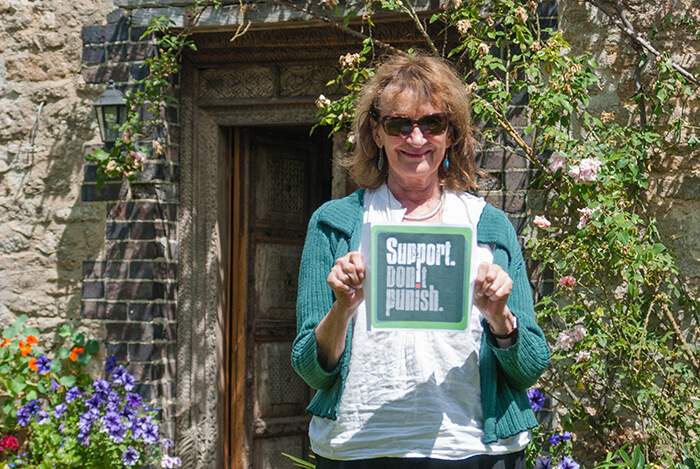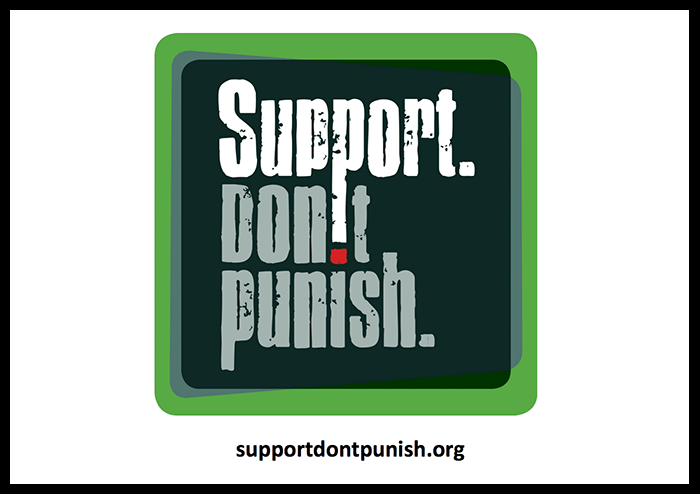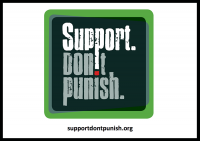
Take Part in the Support. Don’t Punish Global Day of Action

On June 26th, thousands of people around the world will show their support for evidence-based drug policies by taking part in the Support. Don’t Punish Global Day of Action.
Now in it’s fifth year, the initiative began in response to the catastrophic harms caused by the misguided War on Drugs, drawing attention to the appalling human rights abuses brought about by the criminalisation of drugs, and highlighting rational alternatives based on compassion and scientific evidence.
Notwithstanding the moral prejudice that punitive drug policies carry, the main reason to oppose them is that they simply don’t work: global drug use has increased every year since Richard Nixon famously launched the War on Drugs in 1971, and more importantly, so have the associated harms.
Overdose deaths, for example, increased by 137% in the US between 2000 and 2016, and by 64% in the UK in the past two years. Meanwhile, around a third of all HIV transmissions outside of Sub-Saharan Africa are caused by unsafe drug injection, with this figure rising to 67% in some Eastern European countries.
Studies have repeatedly shown that mass incarceration does absolutely nothing to reduce drug use, and only prevents drug users from seeking help or accessing vital resources that could protect them.
The situation is made all the more ludicrous by the fact that these resources are readily available and have been shown to work wherever they have been used. Naloxone, for example, reverses the effects of opioid drugs and helped to prevent 10,000 overdose deaths in 16 US states between 1996 and 2010.
Needle exchange programmes and supervised injection facilities can also help to curb the spread of infectious diseases and prevent overdoses. The first such facility in North America was opened in Vancouver in 2003, and has so far overseen more than than 40,000 drug injections without a single death. In fact, no one has ever died in a supervised injection facility anywhere in the world.

Furthermore, a quarter of those who have had their drugs tested at festivals have ended up choosing not to take them after learning what was in them. Yet by continuing to criminalise drug users, we eliminate the possibility of offering drug testing services, with the result being that many people continue to unwittingly consume dangerous substances that they would not take if they knew what they were adulterated with.
Frustratingly, however, most governments are still unwilling to invest in harm reduction or support for people who use drugs, instead pumping resources into punitive drug control. Statistical modelling carried out by Harm Reduction International and the Burnett Institute shows that if just 7.5% of the $100 billion spent each year on enforcing prohibition was redirected to harm reduction initiatives, HIV infections among people who inject drugs could be cut by 94% by 2030.
To date, the only country to decriminalise the use and possession of all drugs is Portugal, where more than 1,000 new HIV transmissions were reported each year until the legislation was introduced in 2001. This figure dropped to just 56 by 2012, highlighting the importance of providing support rather than punishment for people who use drugs, and the benefits this can bring to society.
The Beckley Foundation advocates the legalisation of all drugs and the creation of legally regulated markets. Removing the criminal aspect of both the supply and consumption of drugs will massively reduce the harms associated with these substances, and allow those most in need to seek help without the risk of persecution.
“It is time to relegate the prohibitionist approach to the dustbin of history,” says Amanda Feilding, founder and director of the Beckley Foundation. “It creates vast profits for criminal cartels, produces ever-stronger drugs, destroys health, criminalises the young and fills prisons, spreading violence and corruption.”
“Let’s take a common-sense approach based on human rights and health, and create a strictly regulated market with the aim of minimising harms while optimising benefits.”
More than 125 cities around the world took part in last year’s Support. Don’t Punish Global Day of Action, with events ranging from marches to talks to exhibitions. If you agree that drug policies should be based on evidence and respect for human rights then be sure to find out where your nearest event is taking place, and get involved!
Words: Benjamin Taub
Podcast
- All
Links
- All
Support
- All
BIPRP
- All
Science Talk
- All
Amanda's Talks
- All
- Video Talk
- Featured
- 2016 Onwards
- 2011-2015
- 2010 and Earlier
- Science Talk
- Policy Talk
One-pager
- All
Music
- All
Amanda Feilding
- All
Events
- All
Highlights
- All
Psilocybin for Depression
- All
Current
- All
Category
- All
- Science
- Policy
- Culture
Substance/Method
- All
- Opiates
- Novel Psychoactive Substances
- Meditation
- Trepanation
- LSD
- Psilocybin
- Cannabis/cannabinoids
- Ayahuasca/DMT
- Coca/Cocaine
- MDMA
Collaboration
- All
- Beckley/Brazil Research Programme
- Beckley/Maastricht Research Programme
- Exeter University
- ICEERS
- Beckley/Sant Pau Research Programme
- University College London
- New York University
- Cardiff University
- Madrid Computense University
- Ethnobotanicals Research Programme
- Freiburg University
- Medical Office for Psychiatry and Psychotherapy, Solothurn
- Beckley/Sechenov Institute Research programme
- Hannover Medical School
- Beckley/Imperial Research Programme
- King's College London
- Johns Hopkins University
Clinical Application
- All
- Depression
- Addictions
- Anxiety
- Psychosis
- PTSD
- Cancer
- Cluster Headaches
Policy Focus
- All
- Policy Reports
- Advisory Work
- Seminar Series
- Advocacy/Campaigns
Type of publication
- All
- Original research
- Report
- Review
- Opinion/Correspondence
- Book
- Book chapter
- Conference abstract
- Petition/campaign
Search type



